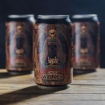At first glance (or even fifth), Munster, Indiana wouldn't seem to be the sort of place that attracts many out-of-town visitors. An old industrial municipality with a population of around 23,000, Munster sits quietly in the northwest corner of the Hoosier State, wedged unglamorously between the grimy southeastern-most reaches of Chicago and the leafy lakefront communities of southwestern Michigan. It's a pleasant-enough burgh, filled with post-WWII single-family houses and 21st century strip malls, but it's probably not high on your list of potential travel destinations.
Unless you're a craft brewing aficionado, that is, in which case Munster is a veritable mecca. Nestled in the shade of a giant water tower that reads "Town of Munster" sits the acclaimed 3 Floyds Brewing Co., which — despite its modest size and limited distribution — is regularly rated among the best craft breweries in the world, thanks to its production of heavily hopped beers like Alpha King, Zombie Dust and Gumballhead.

While it's not uncommon for beer aficionados to drive thousands of miles to load up on cases of hard-to-find 3 Floyds beer at the brewery's carry-out kiosk, peak 3 Floyds visitation occurs on Dark Lord Day, a beer festival held every spring on the vacant lot next to the brewery. Up to 10,000 celebrants converge to sample 3 Floyds' one-day-only release of their legendary Dark Lord imperial stout, chow down on delectable comestibles from food trucks and the 3 Floyds brew pub, and bang their heads to live performances from some of the world's heaviest bands: Dark Lord Day 2017 featured sets from Amon Amarth, High on Fire, Goatwhore, River Black and Powermad.
"You read some reviews of Dark Lord Day, where people are like, 'I don't know why they book these terrible bands,'" laughs Powermad guitarist Todd Haug, a veteran brewer who joined 3 Floyds as Director of Brewery Engineering in late 2016, after spending 12 years with Surly Brewing in Minneapolis. "But for us, it's our chance to assault people with music we want them to hear. And that's always fun!"
While metal may not be every 3 Floyds fan's cup of mead, hard and heavy music is indeed an intrinsic part of the 3 Floyds world. Founded in 1996 by Nick Floyd, his brother Simon and their father Mike, 3 Floyds has engaged in numerous collaborations with notable metal bands over the last decade, beginning with 2010's The Creeper, a doppelbock created in honor of Pelican's 10th anniversary. Recent partnerships in metallic deliciousness include Red Death Sour, a limited-edition sour ale created with Skeletonwitch, and Crack the Skye, a barrel-aged, coffee-flavored Russian imperial stout created with help from Mastodon's Brann Dailor and Chicago's Dark Matter Coffee. (Proceeds from the beer's sales benefit Hope for the Day, a Chicago-based non-profit that promotes suicide prevention.) "I love Zombie Dust and Dark Lord, of course, but 3 Floyds pretty much nail everything they do, and they're one of the most revered breweries in existence," says Dailor. "So for us to be able to do Crack the Skye with them, it doesn't get much better than that."

"It just came out of a natural love of loud music," says 3 Floyds brewmaster Chris Boggess, explaining the brewery's metal connection. "We had a buddy named Barnaby Struve who started working here in 2004 or 2005, who was super into metal and punk rock. So was Nick, and he kind of brought that out in Nick, too. We always just listened to Slayer and Sabbath all day, and made beer."
"Brewing's not a great job," adds Haug. "It's a lot of work, it's hot, it's uncomfortable, things are moving fast. Metal goes with the territory. I don't see how anyone can listen to anything but metal while brewing!"
The parallels between metal music and 3 Floyds beer certainly become apparent as Haug and Boggess lead Revolver around the company's brewhouse. For one thing, there's the constant barrage of loud sounds generated by its five gigantic stainless-steel brewing kettles; for another, there's the incredible amount of technical knowledge and proficiency that's required in the making of beer on such a relatively grand scale.
"Geometry's very important," says Haug, nodding in the direction of a complicated equation hand-scrawled on the side of the conveyor that moves cracked-open malted barley into the mash-mixer, where water is introduced to the brewing process. But there's more to it than that. As with most metal music, 3 Floyds' beers are generally too intense to appeal to mainstream tastes — but that same commitment to "extreme beer" has garnered them an extremely devoted fan base. And as with thrash metal in the days of tape trading, awareness of 3 Floyds' work has largely spread via word of mouth: Since the brewery only distributes their product within Indiana and to the neighboring states of Wisconsin, Ohio, Kentucky and Illinois, most craft brewing aficionados have learned of 3 Floyds via beer blogs and websites like RateBeer and BeerAdvocate.

"Back in '96 when Nick started this, he wanted it to be different," Boggess explains. "There were hoppy beers out there, but nothing like what we're doing. He wanted to maximize flavors. It's always been about 'more' for him, and that's how Dark Lord was born."
First brewed in 2002 (only five barrels were produced) Dark Lord — described by the brewery as "a demonic Russian-style imperial stout brewed with coffee, Mexican vanilla and Indian sugar" — was conceived as a "middle finger" to the rest of the craft brewing world. "There were no other beers like it at the time," says Haug. "Nick had a lot of contempt for what was out there, and Dark Lord was just another example of him being irreverent towards craft beer. It was like everything about beer turned up to 11, so it was the most punk rock, the most metal, the most grindcore thing you could do to beer." It was also a shot over the bow to a local brewery that made an imperial stout that was 'big,'" laughs Boggess. "Nick was like, 'That's not big!'"
"So then the [Dark Lord Day] event started," says Haug, "and it became a big bottle-share experience with the RateBeer and BeerAdvocate community — the beer nerds that kind of created this underground culture of beer. Some of it's gotten bad, some of it's gotten good, but whatever — it got a lot of obscure beers and breweries notoriety without having a marketing budget or distribution all over the planet. And that's what really made Dark Lord a household name." Sealed with colored wax (a different color for each year of its release) and affixed with labels whose artwork wouldn't look out of place on the cover of a death-metal album, Dark Lord set the tone for many 3 Floyds beers to come. It also caught the attention of a lot of musicians, at a time when the metal and brewing worlds were increasingly intersecting.
"In 2005, 2006, [Chris and I] were both meeting a lot of bands, specifically metal," Haug remembers. "We were realizing, 'Holy shit — these guys are into beer like we are into music!' So it was kind of this mutual thing. And that's when the synergy of bringing bands into a collaborative nature of a beer, or putting on shows that were based around a beer — like Dark Lord Day — began." Boggess lists Permanent Funeral — a 100-IBU pale ale brewed with input from Virginia grindcore vets Pig Destroyer — as one of his favorite 3 Floyds collaborations. Ditto for Amber Smashed Face, an aggressively hopped American amber ale brewed for Cannibal Corpse, which will be re-released this November in conjunction with the death-metal legends' new album. "I freaked out when we made a beer with those guys," he laughs. He also cites Morbid Angel, Bolt Thrower and Carcass as high on his wish list for future collaborations.
"Chris is a fan first of these bands and their music, and then the beer [collaboration] sometimes happens out of that organically," Haug explains. "Nick gets contacted by a lot of managers and media people who represent different artists, and it's strictly marketing — and for us, it's like, 'No.' 3 Floyds doesn't need help moving or selling beer to dilute it with a crappy marketing ploy."
The amount of actual artist involvement in the creation of the beer varies widely, ranging from bands who simply tell the brewery what kind of beers that they like, to Municipal Waste's Dave Witte, who actually came down to the brewery to help out with the brewing of Toxic Revolution, an oatmeal stout released in 2013. "3 Floyds are great people, they make some of the sickest beer out there and do the whole band series out of love," says Witte. "When it came down to the collaboration, I had to be a part of it. I helped mash in by pouring all the ingredients in the tank, poured the hops in for dry hopping and came up with the art concept — I'm real stoked on that, it's a jab at big beer. You'll see the Municipal Waste mutant army has decapitated and pulled down a Clydesdale to raise the Panzer Wolf in its place." "Dave's super-passionate about beer," Haug adds.
"That's super cool, and then there's some [collaborations] I've been involved in that are uncomfortably involved, and very direct — and that's cool, too. It's just different depending on the people in the bands and their knowledge of brewing ... "And then you add the brewery's limitations, their distribution footprint, their brew house size," Haug continues. "It's hard to make a 13 1/2 percent stout if you can only make 600 barrels. And some of the beers are crazy; they often match a genre of metal, so they're not going to be your best-selling beer. But I think all the parties involved [in a beer collaboration] have something to gain."
Technical and spatial limitations are very much on the mind of Boggess and Haug, who have been overseeing a multi-phase expansion of the 3 Floyds brewery that includes the construction of an additional brewhouse, a new keg line, new cellars for barrel-aging, a larger brew pub and a tasting room for the 3 Floyds distillery, which is currently producing white whiskey (a.k.a. moonshine) and will eventually produce gin, rum and barrel-aged whiskey, as well. The company will be breaking ground on the new brewhouse this fall, with plans to begin the rest of the construction in the spring. Haug explains that the new brewhouse will be "almost the same exact thing we have [now], but bigger. Both breweries will be independent of each other, so we can still make small batches, or we can combine the two and make bigger batches. There will be a lot of diversity in that."

Haug says that 3 Floyds currently brews about 72,000 barrels of beer annually, and that the addition of the new brewhouse will eventually allow the company to more than double its production. "Just to start, we'll probably be set up to where we can do 100,000 barrels easily ... But with the eventual space to add enough fermenters, we'll have a total capacity of about 160 to 180. That doesn't mean that's what we're shooting for, though, because we might want to make some small-batch beers that take three months to ferment."
Such versatility will be important, since 3 Floyds actively rejects the "flagship model" of many contemporary breweries, in which most of their time and resources are devoted to brewing one particular, popular beer. Since opening in 1996, 3 Floyds has produced over 340 different beers, most of which have only been available in limited runs; even their most popular beers, like their Gumballhead wheat beer or their Alpha King pale ale, can be frustratingly difficult to find. But that, of course, is part of the 3 Floyds mystique.
"If we just made Gumballhead and Alpha King all day, that would be easier for us, and we could probably get away with it, but Nick doesn't really want to rest on his laurels," Boggess explains. "It doesn't make it easy, but it does make it interesting — it's like, 'This is cool, but what's next?'"
"We're always trying to create new things, and I think that's challenging for consumers," Haug adds. "Also, there's a lot of competition out there, now — you can go to any brewery, and they're all making IPAs. It's almost impossible to create something new. It's like music, it's all been done before. But I think people know that 3 Floyds has a solid commitment to quality; and if people are going to spend their hard-earned money on a beer, it's a good, solid bet."







